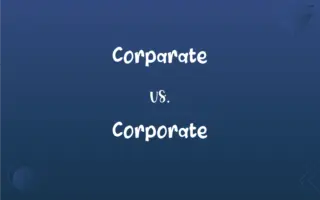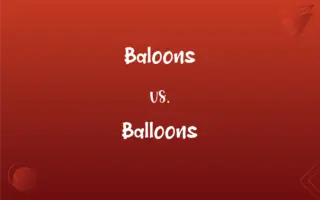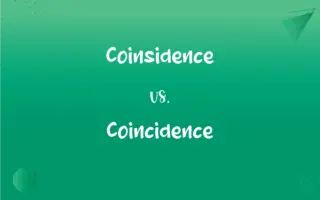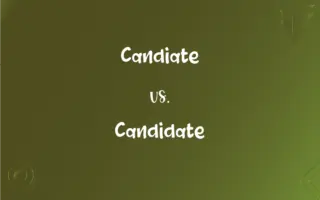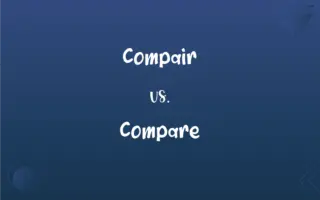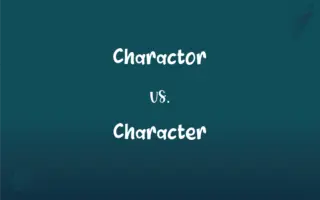Beleve vs. Believe: Mastering the Correct Spelling
Edited by Harlon Moss || By Janet White || Published on March 18, 2024
"Beleve" is an incorrect spelling, the correct spelling is "believe" which means to accept something as true without proof.
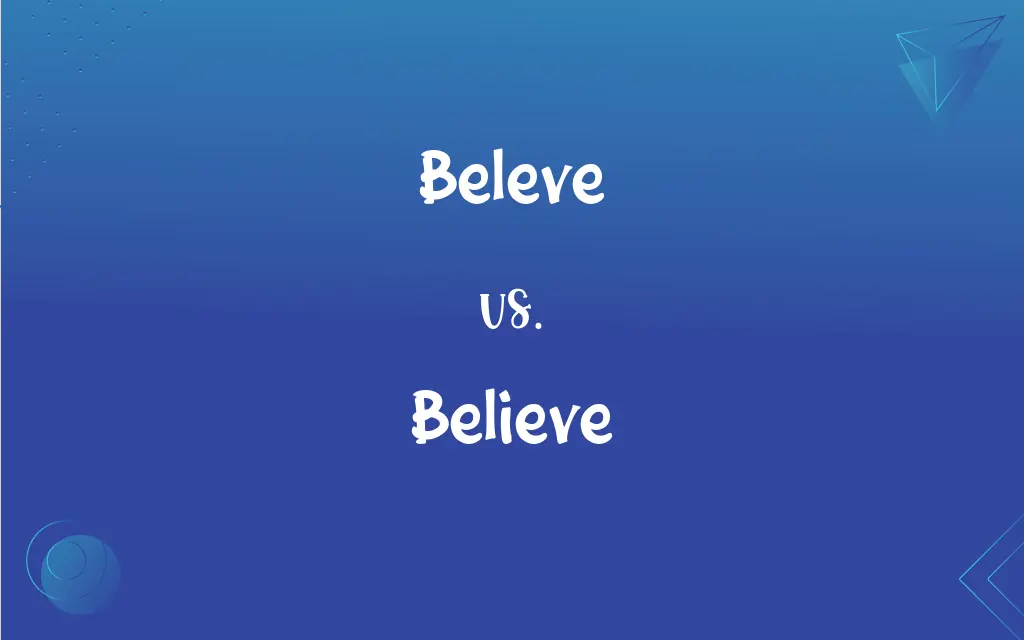
Which is correct: Beleve or Believe
How to spell Believe?

Beleve is Incorrect

Believe is Correct
ADVERTISEMENT
Key Differences
Visualize the word "lie" within "believe," highlighting the correct sequence of "i" and "e."
Recall "believe" includes "eve," as in the evening before, to ensure the "e" before the "v."
The phrase "I believe" helps remember the "i" before "e" except after "c" rule, which does not apply here.
Use mnemonic: "Be a lie-ver," to remember the correct placement of "i" and "e."
Connect the word "believe" with "leaf" to remember the "e" at the end.
ADVERTISEMENT
Correct usage of Believe
She couldn't beleve her eyes.
She couldn't believe her eyes.
It's hard to beleve he's gone.
It's hard to believe he's gone.
They chose to beleve the rumor.
They chose to believe the rumor.
Do you beleve in magic?
Do you believe in magic?
I can't beleve you've done this.
I can't believe you've done this.
Believe Definitions
Accept as true; feel sure of the truth.
She believes that he is innocent.
To have faith, especially in a religious context.
He believes in the power of prayer.
To consider to be true or honest.
He is believed to be the best candidate.
Hold (something) as an opinion; think or suppose.
I believe we've met before.
To trust in the reliability or truth of.
I believe in your abilities to succeed.
To accept (something) as true or real
Do you believe his version of what happened?.
To consider (someone) to be truthful or accurate in what they are saying
I believe you when you say that your neighbor is angry.
To expect or suppose; think
I believe it will snow tomorrow. I believe the letters to be authentic.
Believe Sentences
You have to believe in yourself to succeed.
I believe in the power of kindness.
They believe in giving back to the community.
The teacher made me believe in my abilities.
I believe in working hard for what you want.
She couldn't believe how quickly time had passed.
Do you believe everything you read on the internet?
He couldn't believe his luck when he found the lost ticket.
Many people believe in life after death.
The children believe in Santa Claus.
I don't believe in taking shortcuts to success.
It's important to believe in the values you stand for.
Some people believe in fate, while others believe in making their own destiny.
I believe we can make a difference in the world.
Scientists believe that the discovery could lead to new treatments.
Do you believe that ghosts exist?
You shouldn't believe rumors without evidence.
The jury didn't believe the witness's testimony.
I believe in taking life one day at a time.
Can you believe it's already December?
I believe in the importance of honesty in a relationship.
Believe Idioms & Phrases
Believe in oneself
To have confidence in one's own abilities or worth.
You'll be successful as long as you believe in yourself.
Make-believe
Pretend or imaginary; not real.
The children were lost in a world of make-believe.
Believe you me
Emphasizing that the speaker is telling the truth.
It's going to be tougher than you think, believe you me.
I'll believe it when I see it
Expressing skepticism about something happening.
He says he'll clean his room by tomorrow, but I'll believe it when I see it.
Believe it or not
Used to express that something is true even if it seems surprising or unlikely.
Believe it or not, I've never been on a plane.
To believe one's ears
To be shocked or incredulous at what one hears.
I couldn't believe my ears when I heard I'd won the lottery.
Would have one believe
Used to express skepticism about the truth of what someone says.
He would have us believe he's an expert, but I have my doubts.
Believe me
Used to assure someone that the speaker is telling the truth.
You don't want to go out in this storm, believe me.
Hard to believe
Difficult to accept as true because it seems improbable.
It's hard to believe that they've been married for fifty years.
Too good to believe
So favorable or desirable as to arouse suspicion.
The deal was too good to believe, so I did some more research.
Believe in the cause
To support and have faith in the goals of a particular movement or group.
She volunteers because she believes in the cause.
Believe it when one sees it
A more personal version of expressing skepticism.
He claims he's quitting smoking, but I'll believe it when I see it.
In the believe that
Holding something as true.
They proceeded in the belief that they had all the necessary permissions.
Believe to be true
To accept something as true.
They believed it to be true because it was consistent with their experiences.
Believe the hype
To accept that the enthusiasm or excitement surrounding something is justified.
This movie is as good as everyone says—believe the hype.
Don't believe everything you hear
A warning to not accept all information as true without questioning it.
Don't believe everything you hear; check the facts yourself.
FAQs
What is the singular form of believe?
The singular form is "believe."
Why is it called believe?
It is called "believe" because it originates from the Old English word "beliefan," meaning "to hold dear, esteem, trust."
What is the plural form of believe?
"Believe" does not have a plural form as it is a verb; verbs do not have plural forms.
Which preposition is used with believe?
Common prepositions used with "believe" are "in" and "to."
Which article is used with believe?
Articles ("a," "an," "the") are not typically used directly with the verb "believe."
What is the root word of believe?
The root word of "believe" is the Old English word "leof," which is part of "gelefan" or "beliefan," meaning "dear" or "beloved."
Which vowel is used before believe?
The vowel "e" is used before "believe" in the prefix "be-."
Which conjunction is used with believe?
Conjunctions are not specifically used with "believe," as it depends on the sentence structure.
What is the verb form of believe?
The verb form of "believe" is "believe" itself (present tense).
What is the pronunciation of believe?
Believe is pronounced as /bɪˈliːv/.
Is believe an adverb?
No, "believe" is not an adverb.
Is believe an abstract noun?
No, "believe" is a verb, but its noun form "belief" is an abstract noun.
Is believe a countable noun?
"Believe" is a verb, not a noun, so it is not countable.
Is the believe term a metaphor?
"Believe" can be used metaphorically in certain contexts, but it is not inherently a metaphor.
How many syllables are in believe?
There are two syllables in "believe."
How do we divide believe into syllables?
"Believe" is divided into syllables as "be-lieve."
What is another term for believe?
Another term for "believe" could be "trust" or "have faith."
What is the second form of believe?
The second form is "believed" (past tense).
What is the third form of believe?
The third form is "believed" (past participle).
What is a stressed syllable in believe?
The stressed syllable in "believe" is the second one, "-lieve."
What part of speech is believe?
"Believe" is a verb.
What is the first form of believe?
The first form is "believe" (present tense).
Is believe a noun or adjective?
"Believe" is a verb.
Is believe a negative or positive word?
"Believe" is neutral; it can be used in both positive and negative contexts depending on the sentence.
What is the opposite of believe?
The opposite of "believe" is "disbelieve" or "doubt."
Which determiner is used with believe?
Determiners are not specifically used with "believe" as it depends on the object of the verb in a sentence.
How is believe used in a sentence?
"I believe in the power of kindness."
Is believe a vowel or consonant?
"Believe" is a word, not a letter, so it contains both vowels and consonants.
Is believe a collective noun?
No, "believe" is not a collective noun; it is a verb.
Is the word believe imperative?
"Believe" can be used in the imperative mood, as in "Believe in yourself."
About Author
Written by
Janet WhiteJanet White has been an esteemed writer and blogger for Difference Wiki. Holding a Master's degree in Science and Medical Journalism from the prestigious Boston University, she has consistently demonstrated her expertise and passion for her field. When she's not immersed in her work, Janet relishes her time exercising, delving into a good book, and cherishing moments with friends and family.
Edited by
Harlon MossHarlon is a seasoned quality moderator and accomplished content writer for Difference Wiki. An alumnus of the prestigious University of California, he earned his degree in Computer Science. Leveraging his academic background, Harlon brings a meticulous and informed perspective to his work, ensuring content accuracy and excellence.

